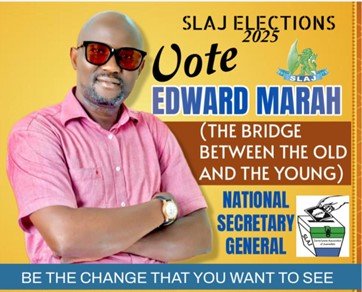By Millicent Senava Mannah
The Electoral Commission of Sierra Leone (ECSL), with funding from the European Union through International IDEA, has concluded a one-day Review and Validation Workshop for its Risk Management Framework and Policy. The significant event took place on Thursday, 7th August 2025, at the New Brookfields Hotel, Jomo Kenyatta Road in Freetown.
The workshop brought together Electoral Commissioners from across the country, along with key representatives from the European Union, International IDEA, and the Electoral Commission of South Africa.
Delivering the keynote address, Oversight Commissioner Abubakarr Koroma emphasized that the policy aims to identify and mitigate both internal and external risk factors that affect electoral processes. He explained that the framework is designed to guide ECSL in managing risks specific to each election cycle and adapting to evolving threats.
“Our goal is to develop a robust system that evolves with changing risks, ensuring elections that are credible, transparent, and acceptable to the majority of Sierra Leoneans,” said Commissioner Koroma.
He noted that Sierra Leone is drawing lessons from other electoral management bodies such as the Independent Electoral Commission (IEC) of South Africa and the Electoral Commission of Kenya, both of which have made strides in risk management.
Commissioner Koroma disclosed that staff from the IEC of South Africa were invited to support the development of the policy and framework. He acknowledged that challenges are dynamic and may evolve before the next general elections, stressing the importance of continuous assessment.
He identified major risk factors in past elections, including political violence, intimidation, harassment, disinformation, and misinformation. He explained the difference between internal risks, which are within ECSL’s control, and external risks, which require broader strategies involving multiple stakeholders.
Mamoud Tarawallie, Head of Programmes at International IDEA, explained that the workshop is part of a four-year EU-funded programme supporting electoral activities. He noted that ECSL requested risk management support in 2021, leading to the establishment of a risk management tool within the Commission.
“This framework is vital to institutionalize risk management within ECSL and ensure that elections are not only technically sound but also widely accepted,” said Tarawallie.
He highlighted the broader work of International IDEA in supporting electoral management bodies (EMBs) and government institutions in enhancing election integrity, transparency, and preparedness.
The Representative of the EU Delegation expressed appreciation for ECSL’s commitment to electoral reforms and modernization. He commended International IDEA for their expert support and acknowledged the contribution of consultants from the IEC of South Africa.
“This workshop is part of our long-standing partnership with Sierra Leone, aimed at consolidating peace and democracy,” he said.
He stressed the importance of preparing well in advance of the 2028 elections and reforming legal frameworks to align with international best practices.
“Professional risk prevention and management is critical to strengthening the credibility of elections in Sierra Leone,” he concluded.
In a brief but impactful speech, Commissioner Zainab U. Moseray underscored the importance of building institutional resilience to confront emerging threats in the electoral process.
“This framework is more than a document, it is a strategic commitment to defend the integrity of our elections and restore public trust,” she said.
Commissioner Moseray called for collaboration among political actors, civil society, and development partners in implementing the framework.
“No institution can manage electoral risks in isolation. We must foster unity, transparency, and foresight in the way we operate,” she added.
She thanked the European Union, International IDEA, and the IEC of South Africa for their continued support and expertise, reaffirming ECSL’s commitment to learning, adaptation, and reform.
The success of the new Risk Management Framework and Policy will be evaluated by the conduct of the 2028 general elections. Stakeholders remain hopeful that with the right tools, cooperation, and international support, Sierra Leone can organize elections that are credible, inclusive, peaceful, and transparent.




